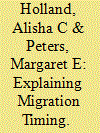| Srl | Item |
| 1 |
ID:
161967


|
|
|
|
|
| Summary/Abstract |
In Latin America, the relationship between income and support for redistribution is weak and variable despite the region's extreme income inequality. This article shows that this condition is rooted in the truncated structure of many Latin American welfare states. Heavy spending on contributory social insurance for formal-sector workers, flat or regressive subsidies, and informal access barriers mean that social spending does far less for the poor in Latin America than it does in advanced industrial economies. Using public opinion data from across Latin America and original survey data from Colombia, the author demonstrates that income is less predictive of attitudes in the countries and social policy areas in which the poor gain less from social expenditures. Social policy exclusion leads the poor to doubt that they will benefit from redistribution, thereby dampening their support for it. The article reverses an assumption in political economy models that welfare exclusion unleashes demands for greater redistribution. Instead, truncation reinforces skepticism about social policy helping the poor. Welfare state reforms to promote social inclusion are essential to strengthen redistributive coalitions.
|
|
|
|
|
|
|
|
|
|
|
|
|
|
|
|
| 2 |
ID:
156836


|
|
|
|
|
| Summary/Abstract |
Comparative research on Latin American welfare states recently has focused on the extension of non-contributory benefits to those outside the formal labor market. This extension of benefits constitutes a major break from past exclusionary welfare regimes. Yet there also are substantial areas of continuity, especially in the contributory social-insurance system that absorbs most of welfare budgets. We develop here a framework for studying changes in Latin American welfare states that reconciles these trends. We argue that Latin American governments enjoyed an “easy” stage of welfare expansions in the 2000s, characterized by distinct political coalitions. Bottom-targeted benefits could be layered on top of existing programs and provided to wide segments of the population. But many Latin American governments are nearing the exhaustion of this social-policy model. We explore policy and coalitional challenges that hinder moves to “hard” redistribution with case studies of unemployment insurance in Chile and housing in Colombia.
|
|
|
|
|
|
|
|
|
|
|
|
|
|
|
|
| 3 |
ID:
172833


|
|
|
|
|
| Summary/Abstract |
How do migrants decide when to leave? Conventional wisdom is that violence and economic deprivation force migrants to leave their homes. However, long-standing problems of violence and poverty often cannot explain sudden spikes in migration. We study the timing of migration decisions in the critical case of Syrian and Iraqi migration to Europe using an original survey and embedded experiment, as well as interviews, focus groups, and Internet search data. We find that violence and poverty lead individuals to invest in learning about the migration environment. Political shifts in receiving countries then can unleash migratory flows. The findings underscore the need for further research on what migrants know about law and politics, when policy changes create and end migrant waves, and whether politicians anticipate migratory responses when crafting policy.
|
|
|
|
|
|
|
|
|
|
|
|
|
|
|
|
| 4 |
ID:
147237


|
|
|
|
|
| Summary/Abstract |
Particularly in developing countries, there is a gap between written law and behavior. Comparative research emphasizes that laws go unenforced due to resource constraints or inadequate control of the bureaucracy. I instead introduce the concept of forbearance, or the intentional and revocable nonenforcement of law, and argue that politicians often withhold sanctions to maximize votes as well as rents. Drawing on tools from price theory and distributive politics, I present several methods to separate situations when politicians are unable versus unwilling to enforce the law. I demonstrate the identification strategies with original data on the enforcement of laws against street vending and squatting in urban Latin America. In contexts of inadequate social policy, politicians use forbearance to mobilize voters and signal their distributive commitments. These illustrations thus suggest the rich, and largely neglected, distributive politics behind apparent institutional weakness.
|
|
|
|
|
|
|
|
|
|
|
|
|
|
|
|